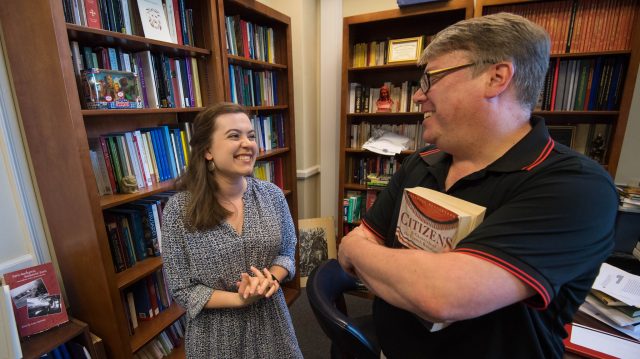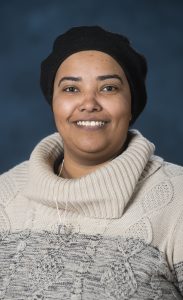
Daniel O’Sullivan (right), chair and professor of modern languages at the University of Mississippi, chats with a student in the program. The department’s doctoral program has become one of the fastest-growing on campus. Photo by Kevin Bain/Ole Miss Digital Imaging Services
OXFORD, Miss. – Four years ago, the doctoral program in the University of Mississippi‘s Department of Modern Languages began with five full-time students. That enrollment has since multiplied 11 times the original number and counting.
The degree is designed to educate professionals who can provide second language training for firms that conduct business globally and need workers who can speak Spanish and other languages. The program also trains future modern language administrators for universities and other institutions.
While the numbers have not been finalized, 55 students are active in the program. A university official said he expects there to be more than 60 in the fall.
“Our graduate program has quickly become internationally known,” said Daniel O’Sullivan, chair and professor of modern languages. “Some of this has come down to recruiting – either active through trips by staff/faculty pre-pandemic or passive via our website.
“A lot also has to do with word-of-mouth and the good things our students say about the program to their teachers overseas.”
The degree program has two tracks. One is in applied linguistics, which is geared toward understanding empirical data about languages, dialect variation, second language acquisition, multilingualism, language use and rights, locally situated language problems, language curricula planning and policy, and teacher training.
The second track is in Spanish. It focuses on meeting the growing demand for professionals and academics who understand the language and culture of Spanish-speaking communities and how to apply that knowledge to real-world communication around the world.

Asmaa Taha, one of the first students to enroll in the Department of Modern Languages’ doctoral program, graduated in May and served as a class marshal. Photo by Christian Johnson/Ole Miss Digital Imaging Services
“In a rather short period of time, it has established itself nationally and internationally as a program that successfully trains and prepares graduate students for academic careers in language teaching, pedagogy and second language acquisition with a strong underpinning of both applied and theoretical linguistics and hands-on experience in the classroom,” said Donald Dyer, associate dean for faculty and academic affairs and distinguished professor of modern languages.
“The college is extremely proud of the program’s success, its growth and its prospects for the future and will continue to invest in the program as much as it is able.”
Asmaa Taha and Lin Zhu were among the inaugural students in the program. Taha, who was a class marshal at the university’s 2021 Commencement exercise, finished her Ph.D. in December while working full-time in the university’s Arabic Language Flagship Program. Zhu is on the faculty at Tulane University.
Several students are actively engaged in promoting the program. A website entirely composed and maintained by students shows all the countries from which Ole Miss students hail.
“We are training them to be become leaders in their fields upon receiving their Ph.D.s and then to be transformative in education, government or industry through their linguistic and analytic skills,” O’Sullivan said.
“We want them to show initiative, and so we were delighted to learn that several of them banded together to form the Graduate Student Colloquium in Applied Linguistics and TESOL, where they organize a colloquium once a semester in which one of our students gives a professional-type presentation to students and faculty.”
Most recently, the students have established an online journal, the University of Mississippi Working Papers in Applied Linguistics.
The degree prepares students to be leaders locally, regionally, nationally and internationally, said Felice Coles, the program’s graduate coordinator and professor of modern languages.
“The emphases in applied linguistics and Spanish will give students a greater understanding of how to learn, teach and work with speakers of many languages around the world,” Coles said. “Using their valuable and marketable skills, our Ph.D. graduates will happily find jobs in education, government and industry.”
To view the student-led website for the program, visit here.